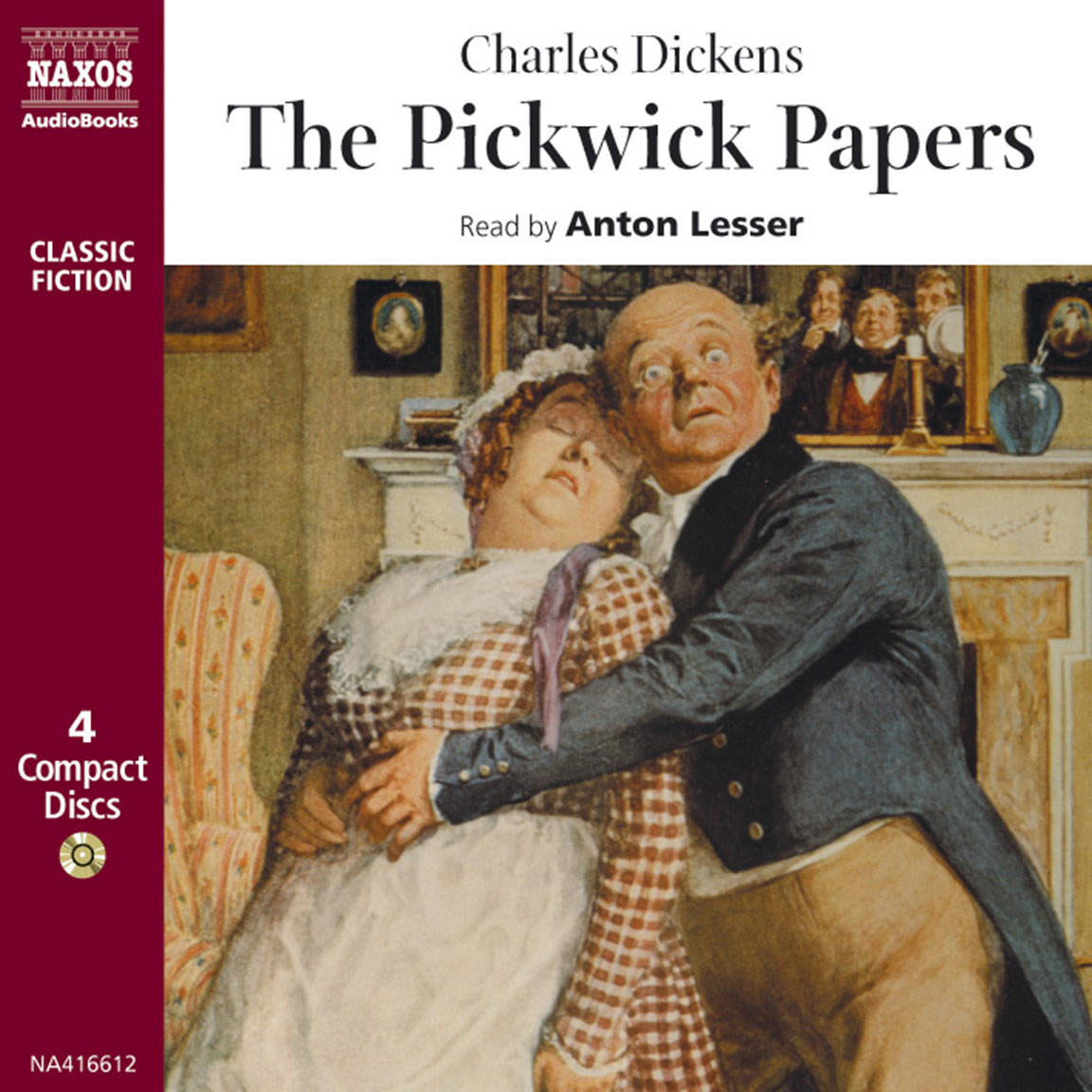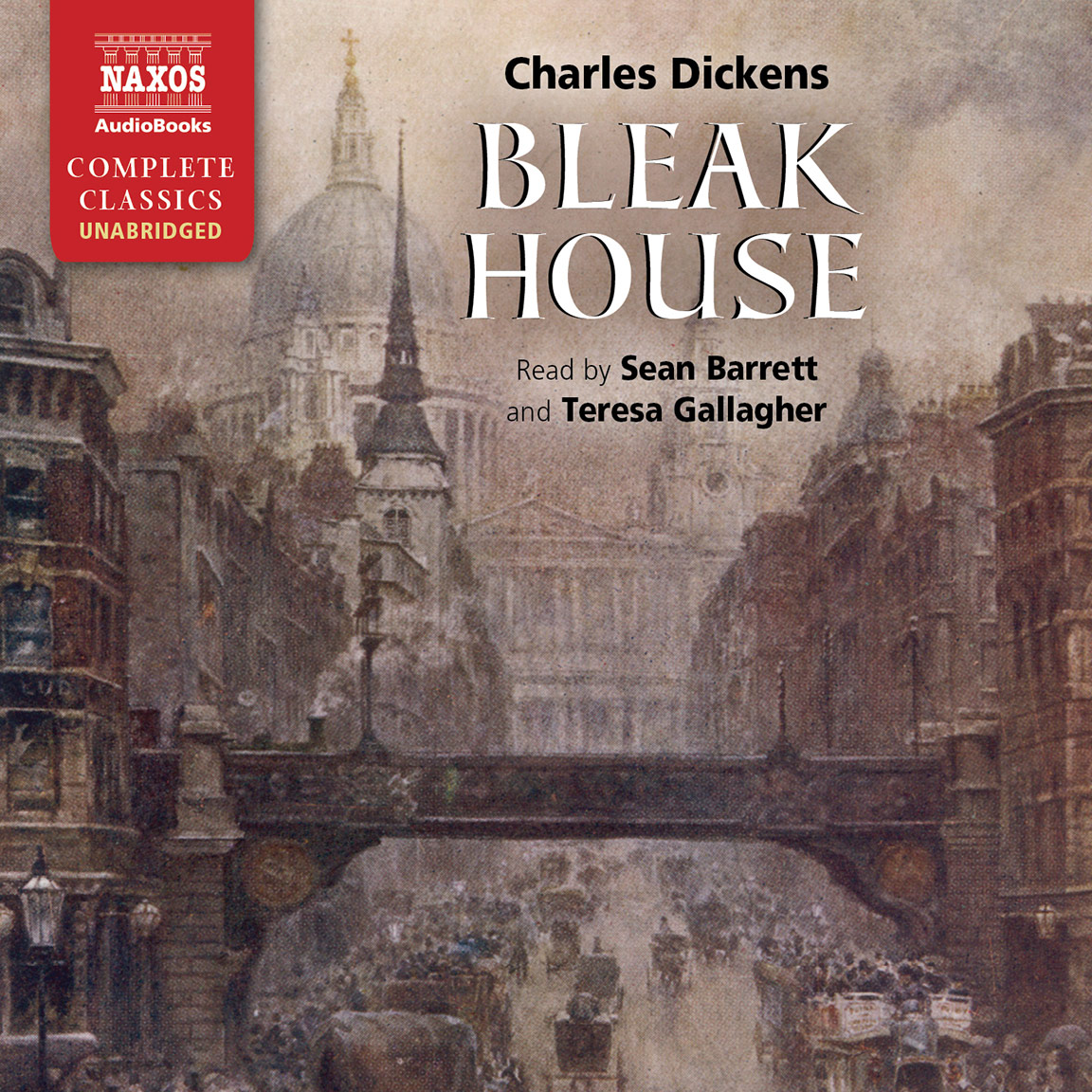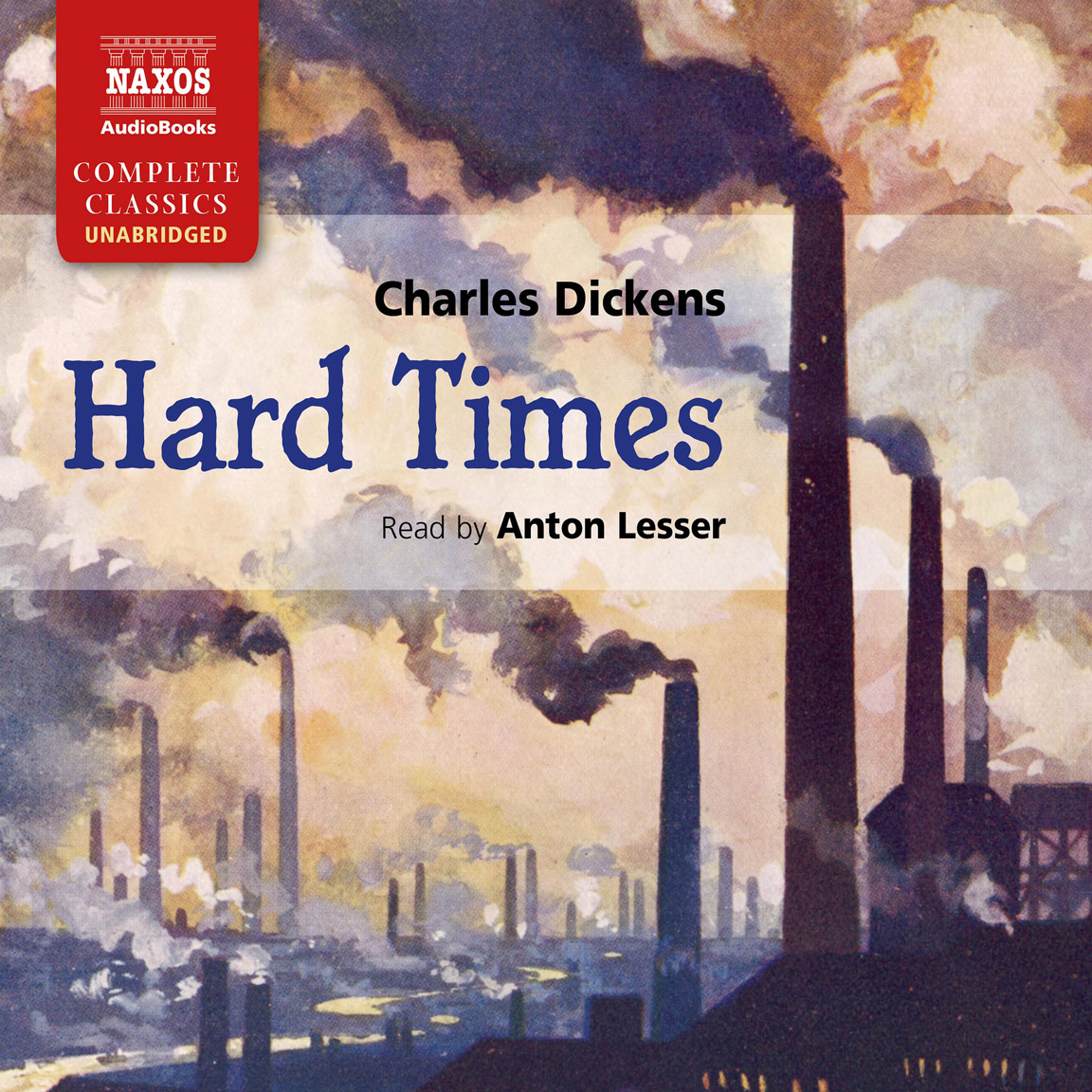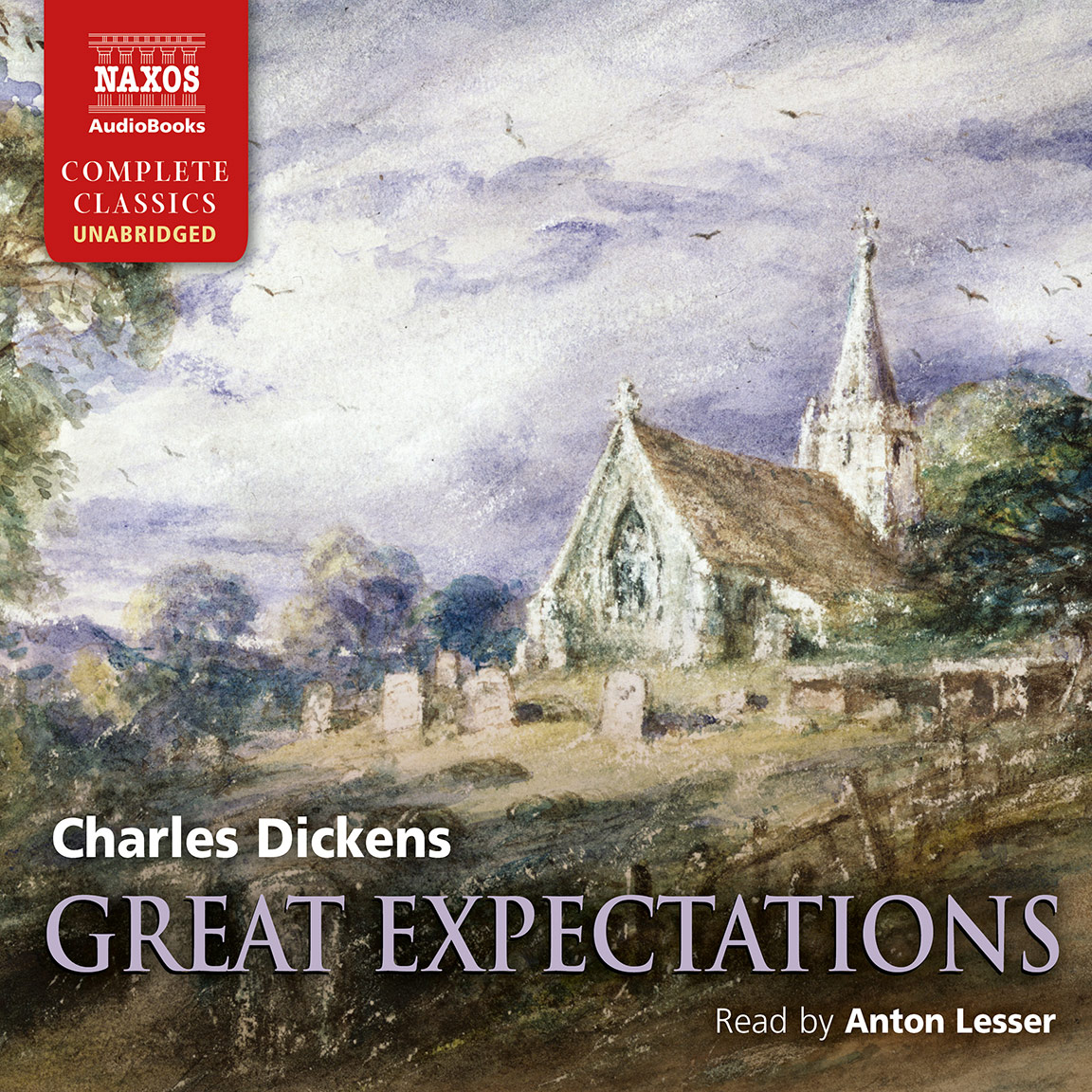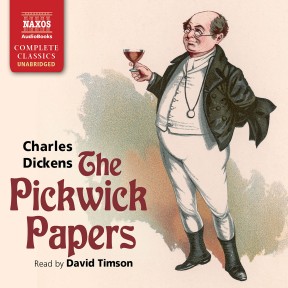
Audio Sample
Charles Dickens
The Pickwick Papers
Read by David Timson
unabridged
In The Pickwick Papers, his first novel, Dickens displays the talents and skills that became his trademark; observational humour, pathos and social comment abound as we follow Mr Pickwick and Sam Weller, his sharp-tongued cockney servant, travelling around England with his friends in search of adventure and knowledge. Brilliantly comic scenes at the Eatanswill election, and the trial of Mrs Bardell vs Pickwick contrast with the horrors of the debtors prison. It was Thackeray who described the novel as ‘that great contemporary history’, and it presents a nostalgic view of England just before the coming of the railway.

-
Running Time: 32 h 13 m
More product details
Digital ISBN: 978-1-84379-556-8 Cat. no.: NA0071 Download size: 462 MB BISAC: FIC004000 Released: April 2012 -
Listen to this title at Audible.com↗Buy on CD at Downpour.com↗Listen to this title at the Naxos Spoken Word Library↗
Due to copyright, this title is not currently available in your region.
You May Also Enjoy
Reviews
Winner of AudioFile Earphones award
In Dickens’s first novel, the many adventures, or perhaps misadventures, of Mr Samuel Pickwick and his traveling companions are detailed in a series of interrelated vignettes ranging from the frightening to the absurd. David Timson is a one-man ensemble who skillfully portrays dozens of characters. He is equally adept at chilling the spine with the gravelly, breathy tones of a madman as he is at tickling the ribs with the clipped speech and perfect comedic timing of a bold charlatan. Even his female voices, while seemingly overdramatic, capture the delicate nature of Dickensian women, who are oftentimes prone to fainting spells and fits of hysteria. Like the novel itself, Timson creates a superb portrait of nineteenth-century England that Dickens himself might have declared ‘a capital performance.’
M.D., AudioFile
It is a lot of money, but it’s also a lot of wonderfully funny stories, brilliantly read, about four trouble-prone Victorian gents pontificating, spooning, wining, dining, trundling about in stage coaches and meeting characters only Dickens could imagine and bring to vivid life. “‘Don’t be long,’ said the spinster aunt affectionately. ‘Long? Away? From you? Cruel charmer,’ and Mr Jingles skipped playfully up to the spinster aunt and imprinted a chaste kiss on her lips and danced out of the room. ‘Dear man,’ said the spinster as the door closed after him. ‘Rum old girl,’ said Mr Jingles as he walked down the passage.” To get a marriage licence and take all her money, of course.
Sue Arnold, the Guardian
Superbly performed by BBC Radio Drama veteran David Timson, The Pickwick Papers is an unabridged audiobook adaptation of Charles Dickens’s debut novel, now justly recognized as a classic. Set in England shortly before the advent of the railroad, The Pickwick Papers follows the upper-class Mr Pickwick and his caustically comedic cockney servant Sam Weller, as they travel the nation in search of adventure and learning. From comic moments such as the Eatanswill election and the trial of Mrs Bardell vs. Pickwick to the stark atrocity that was debtors prison, The Pickwick Papers is a superb rendition of Dickens’s grand and thoroughly engaging adventure. The Pickwick Papers is worthy of the highest recommendation for public library audiobook collections, and as a special gift for audiobook lovers who especially enjoy great literary treasures.
Library Bookwatch, Midwest Book Review
Timson’s irrepressible performance of this rollicking romp through 1830s England in Dickens’s first novel invites listeners along as Pickwick and his crew ramble through the countryside. With broad satire and clever irony, Timson proves a delightful guide through slapdash adventures and a host of eccentric characters.
The Reference and User Services Association (RUSA), a division of the American Library Association (ALA)
Starred review
With true artistry, narrator David Timson brings to life the misadventures of the Pickwick Club. In Dickens’s first novel, Samuel Pickwick (founder and president of the eponymous club) and three ‘Pickwickians’ travel outside the comforts of London to document life in the English countryside. What follows is a succession of incidents filled with eccentric characters and social commentary. Clocking in around 32 hours, this audio edition would be an arduous task for any narrator, but Timson embraces this intimidating assignment with admirable aplomb. Whatever the scenario presented in prose, he matches the tone and keeps the story moving at a steady clip. He perfectly captures the author’s many characters, providing spot-on vocal characterization for each one. This is an outstanding listen for both fans of Dickens and those new to his work.
Booklet Notes
The Pickwick Papers actually began life as a project to promote the humorous illustrations of Robert Seymour, who was enjoying success in the 1830s as a depicter of the cockney sportsman ineptly indulging in the country pursuits of hunting, shooting, and fishing. However, the publishers Chapman and Hall felt that a text was needed to link the illustrations, and turned their attention to a rising 24-year-old in the field of journalism who wrote under the name of ‘Boz’ and who had been making his name as a humorous observer of the habits and quirks of London life in a series of articles for The Morning Chronicle and other papers. These were eventually collected together and published as Sketches by Boz. ‘Boz’ was the pen-name of Charles Dickens.
1836 was an important year in young Dickens’s already busy life. He accepted the commission from Chapman and Hall to provide a text for Seymour’s illustrations, using it as an opportunity to write his first novel; then, with the security of an income, he married his fiancée, Catherine Hogarth, on 2 April, between writing the first and second instalments of The Pickwick Papers.
From the first it seems Dickens intended to make the project his own:
I objected on consideration that although born and partly bred in the country I was no great sportsman… that the idea was not novel, and had already been much used and that it would be infinitely better for the plates to arise naturally out of the text; and that I would like to take my own way with a freer range of English scenes and people, and was afraid I should ultimately do so in any case, whatever course I might prescribe to myself at starting.
Dickens produced the first two chapters and then submitted them to Seymour, in an attempt to mould the established artist to his own scheme of things, thereby cheekily reversing the agreed artistic process. Meeting with Seymour to discuss some minor alterations to the first two plates, and leaving him apparently satisfied with his suggestions, Dickens was horrified to learn that the artist had committed suicide two days later. This tragic circumstance meant that the project, planned to appear in 19 monthly parts and which was well on the way towards the publication of its first instalment, would have to be completely re-thought. Dickens’s text would now dominate, and though the first instalment would contain Seymour’s two completed plates, a new illustrator would have to be found for the remainder of the series. After a failed commission with a Mr Buss, a young comic artist called Hablot Knight Browne was contracted, a man whom Dickens found to be in perfect sympathy with his own comic spirit. Browne signed his works as ‘Phiz’, and thereafter ‘Boz` and’ Phiz’ became inseparably linked in the public’s mind. Phiz went on to illustrate 10 of Dickens’s subsequent novels.
Dickens knew he could not confine himself exclusively to writing about the exploits of Cockney sportsmen, or even a ‘club’, and apart from the character of Winkle, the naïve city dweller who pretends he has a facility for all things sporting, Dickens does not explore the theme further.
Likewise the restrictive formula set out in Chapter One, that all the adventures should be relayed back to the Pickwick Club in London by written report and then re-told by an editor, is soon dropped after the early chapters. This freed Dickens to write without any restrictions. What he in fact created is a rambling, picaresque novel: a tribute to the literary heroes of his childhood, Fielding and Smollett, who first evolved this kind of novel, based upon a journey or series of excursions allowing them to introduce random characters and situations as their genius suggested. These excursions link Dickens’s loosely constructed narrative, assisted by the copious amounts of drinking and eating regularly indulged in at every journey’s end. A lot of the book’s charm is to be found in the nostalgic descriptions of travelling by coach or gig, soon to fall victim, by 1836, to the advance of the railway.
In place of the ‘club’, the book focuses on the benign Mr Pickwick alone, founder of the club and hailed by its members as a man of significant intellect and genius. But the joke is that Mr Pickwick is just an ordinary man with nothing exceptional about him but his old-fashioned tights and gaiters, and who is elevated to a higher plane by his friends, Snodgrass, Tupman and Winkle, who call him ‘Immortal’, and who don’t themselves even reach his modest intellectual heights. However, Dickens develops Mr Pickwick from an unworldly and naïve figure into a true philanthropist who shows understanding and sympathy, even magnanimity, towards the likes of Jingle who took advantage of his good nature, and Mrs Bardell, whose legal action for breach of promise against him led to Pickwick’s humiliation in the debtors prison.
The Pickwick Papers became an advertisement for Mr Charles Dickens, a young author displaying his wares to the public and showing promise of greater things to come. In fact, we can feel the young author’s style maturing as the book proceeds, to the extent that by the time he puts Mr Pickwick in the Fleet prison for debt, he is making a social and political comment, drawn from his own bitter remembrances as a child of his father’s imprisonment for debt in the Marshalsea prison. His descriptions of life inside are as moving and finely written as passages in his later novels. This episode anticipates Dickens’s inclination for reform, so much a part of his later writings. He also criticises the law, exposing the incompetence of country magistrates and the corruption of lawyers such as Dodson and Fogg. He would expand his concerns about the law in Bleak House, and the prison system in Little Dorrit.
Dickens also incorporates into The Pickwick Papers the traditional element of travellers tales, which are randomly interspersed into the narrative, giving him the opportunity once again to show his skills and versatility of style. The pathos of The Stroller’s Tale anticipates the death-bed scenes in The Old Curiosity Shop and Dombey and Son; whilst The Story of the Goblins who Stole the Sexton has more than a hint of A Christmas Carol about it. Other interpolations reflect Dickens’s taste for sentiment and morbidity.
But it is the comedy we relish the most, and Dickens lays down in this, his first novel, the comic trends we now associate him with. The Pickwick Papers abounds in portraits of lower middle-class and working-class characters: lawyers and their clerks, county magistrates, medical students, inn-keepers, waiters, chambermaids, coachmen, cabmen and more, their foibles and follies exposed with rich humour and understanding. Rising in their midst is one of Dickens’s greatest comics creations: Mr Samuel Weller, a boot-black who becomes Mr Pickwick’s manservant and whose personality comes to dominate the book, and change its nature. His cockney verve and wit give comic energy to the narrative and his exchanges with his father Tony are classic. Not one to suffer fools, Sam speaks his mind openly with honest perception. His devoted care and attention for his unworldly master is truly touching, and the heart of the book is the developing mutual dependency of master and man, revealed in the comic interplay of their contrasting natures.
Soon after publication, Sam’s sayings were extracted from the book and circulated as ‘Wellerisms’ throughout the English-speaking world, just a part of the craze that grew up around The Pickwick Papers, leading to pirated editions and theatrical adaptations. The introduction of Sam Weller sealed the success of The Pickwick Papers; the initial print run had been only 400, but by the last instalment it had increased to 40,000. So great was the ‘Pickwick’ craze, that a contemporary remarked it had ‘secured far more attention than was given to the ordinary politics of the day.’ There were ‘Pickwick’ cigars, hats and coats, and ’Pickwick’ was the buzz-word of 1836.
Early reviewers were amazed by the rapid success of young Boz’s first novel. The Quarterly Review suggested that he could not keep up this energetic comic style, and though he had ‘risen like a rocket’, he would ‘come down like the stick.’ While The London and Westminster Review boldly stated:
We purpose… to investigate the foundation of a popularity extraordinary on account of its sudden growth, its vast extent and the recognition which it has received from persons of the most refined taste, as well as for the great mass of the reading public.
But investigation or explanation was unnecessary, for Dickens was no passing phenomenon. With the publication of The Pickwick Papers, Dickens had arrived to stay.
Notes by David Timson
